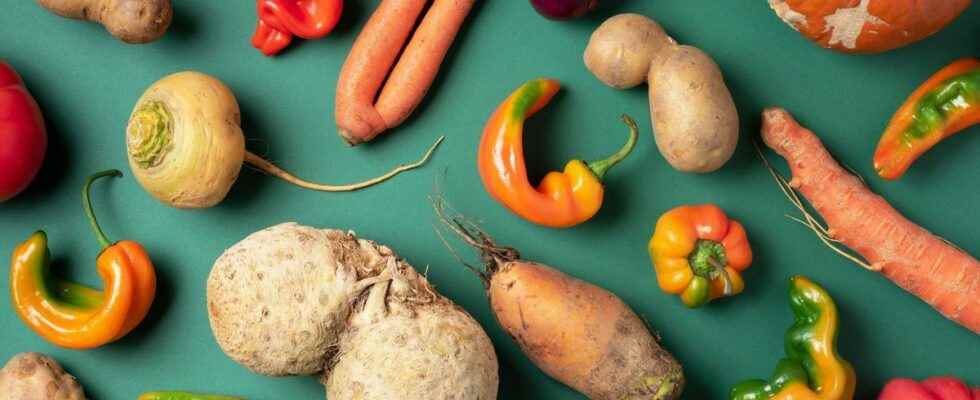Published on
Updated
Reading 2 mins.
The anti-waste sector is surfing on rising prices to establish itself as a new “consumption routine”, between savings prospects and the quest for better food.
Since July 7, the Carrefour hypermarket in Montesson (Yvelines) has become a refuge for “ugly” products. Twisted cucumber, red pepper stained with green or camembert a little too light to claim the name, these articles hitherto without outlets have found a place on the shelves. Cautious at first, the curious roll their eyes at their price: “20 to 25% cheaper” than their core market equivalent, says the store.
A buying opportunity
The anti-waste initiative comes at the right time as inflation rose to 5.8% over one year in June according to INSEE, and at the same level in food. “It’s a buying opportunity” for customers who would otherwise have deprived themselves of meat or fruit because of the rise in prices, explained during a visit the CSR director (social and environmental responsibility) of Carrefour, Bertrand Swiderski.
The goal is to have a “less standardized offer”continued the co-founder of “We anti-waste” Charles Lottmann, project partner and creator of the range. “Flexibility” on the appearance of the products, “short dates” Where “variable weight”it was a victim of its success and the stalls robbed, assured Mr. Swiderski.
Over 4 million users
Anti-waste purchases were initially perceived as a “ecological commitment”, says Jean Moreau, co-founder of the application specializing in unsold items, Phenix. But they “are becoming a consumption routine” in response “to the issue of purchasing power“, he adds.
“We have on average 12% more registrations” per month since the beginning of the year compared to the previous year, continues Mr. Moreau. The application has exceeded 4 million users by attracting new profiles such as the elderly and by strengthening its base of students, attracted by discounts from “50% minimum”. The trend is even stronger at industry leader TooGoodToGo. “In the month of June alone, downloads jumped 42% compared to June 2021” and the frequency of purchases is increasing, its director for France, Sarah Chouraqui, told AFP.
Already familiar with these platforms, Fabien Da Silva, a 24-year-old alternating computer scientist, is increasing orders to reduce the effects of rising prices on his consumption. “I regularly take a basket containing 3 to 4 items of meat, I avoid buying them in the supermarket because I can’t afford it”he develops.
“I order almost every day”testifies for his part Thomas, a 47-year-old executive who wishes to remain anonymous for professional reasons. “Partial unemployment has reduced my lifestyle”, he develops, the anti-waste baskets allow him to “eat for 5 to 8 euros a day”, versus “15 to 20 euros” before, enough to reduce the effects of inflation.
NO to diets, YES to WW!
Promote the short circuit
The dynamic has spread to more confidential local networks, which advocate direct exchanges between small producers and customers, even from individual to individual. It is “bring up to date this practice that we had, of giving away (or selling at a knockdown price) the vegetables that we had too many in our garden, when we could not eat them”explains Inès Bazillier of Fruit and Food.
Born a year ago and established mainly in the south-east, the start-up has recruited a quarter of its 8,000 members in recent weeks, boosted by a constant desire of the French to eat “healthy and local” despite rising prices. Some “pay for a kilo of apricots but leave with a box of five kilos” thanks to the generosity of the gardener, others come to the locals “pick straight from the tree, and for free”laughs Ms. Bazillier, who counts as many regulars of short circuits as users “looking for good deals”.

